This article was co-authored by Alyssa Chang. Alyssa Chang is a nutrition coach and trainer, based in the San Francisco Bay Area. She uses her extensive background in brain-based neuroscience to work with clients on improving their connections with their brain and body to heal, reach goals, and move pain-free. She holds a BS in Kinesiology and Exercise, Nutrition and Wellness from the California State University, East Bay and is certified in Precision Nutrition, Z-health Performance and is certified by the National Council for Strength and Fitness.
wikiHow marks an article as reader-approved once it receives enough positive feedback. In this case, 83% of readers who voted found the article helpful, earning it our reader-approved status.
This article has been viewed 118,454 times.
Most people struggle with self-esteem throughout their lives. Even the most positive, confident people get down on themselves sometimes. But what do you do when you're constantly putting yourself down and can't seem to lift yourself back up? It's a slow process, but you can learn to stop negative self-talk right in its tracks and make changes to recognize that you're an amazing human being.
Steps
Making Internal Changes
-
1Make a list of good things you've done and things you like about yourself. Maybe you think you have lovely hands, or you are good at drawing. Maybe you once bought coffee for the person behind you in line, just to be nice. Focusing on your positive qualities will help you combat your self-criticism.[1]
- Nothing is too small--make this list long, and reach as far back into your past as you want.
- What are some of your best qualities? Are you creative? Helpful? Kind?
- What have you achieved in your life so far? Have you graduated high school? Did you ace a difficult test? Did you teach yourself a new skill?
- Read this list often, even when you're not feeling down.
EXPERT TIPAlyssa Chang is a nutrition coach and trainer, based in the San Francisco Bay Area. She uses her extensive background in brain-based neuroscience to work with clients on improving their connections with their brain and body to heal, reach goals, and move pain-free. She holds a BS in Kinesiology and Exercise, Nutrition and Wellness from the California State University, East Bay and is certified in Precision Nutrition, Z-health Performance and is certified by the National Council for Strength and Fitness.Wellness Coach & Personal Trainer
 Alyssa Chang
Alyssa Chang
Wellness Coach & Personal TrainerOur Expert Agrees: Making lists of things you like about yourself is super helpful. You can also write down things that you're grateful for, such as your health, your job or hobbies, or your friends. This will help you to see the positive aspects of your life.
-
2Start your day with affirmations. An affirmation is something you say to support or encourage someone--in this case, yourself. It may feel silly, and you may not believe it at first, but start and end your day by looking in the mirror and saying your affirmation out loud.
- Write your affirmation on a sticky note a post it on your mirror. Or write it on the back of a business card and keep it in your wallet to remind you throughout the day.
- Some affirmations include: "I love myself," "I like and accept myself as I am," "I believe in myself," "I am worthy of love."
Advertisement -
3Halt negative talk. When you make a mistake, what goes through your mind? Do you call yourself stupid, or a loser, or say any number of negative things about yourself? The moment you start having those thoughts, you need to stop yourself. Say it out loud or under your breath or in your head: Stop. Even if that means you have to say "stop" every ten seconds.
- Wear a rubber band around your wrist and snap it every time you put yourself down.[2]
- Acknowledge the thought, then imagine throwing it in a trash bin or physically getting rid of it in some way.[3]
- This won't stop negative thoughts forever, but it will stop you from listening or allowing them to take hold.
-
4Treat yourself like a friend. Think about all the ways you put yourself down, then imagine doing those things to a friend or loved one. Or imagine someone doing or saying those things to your best friend. Would you let them get away with that? Start treating yourself with the same respect and courtesy you would show a friend.[4]
- Instead of putting yourself down when you have a problem, think about how you would help a friend in the same situation.[5]
-
5Stop comparing yourself to other people. Almost everyone does this, and it can be very destructive to your self esteem. Judging yourself against someone else--whether it's their looks, grades, personality, popularity, achievements--will always leave you unsatisfied. There will always be someone who seems to be better looking, or smarter, or cooler than you are. But these people aren't perfect, either. Focus on your strengths and what makes you great.[6]
-
6Forgive your mistakes. Focusing on bad decisions and mistakes doesn't undo them. Instead, try to learn from your mistakes and do better next time. Even if you make the same mistake more than once, it's part of being human. You can recognize your shortcomings without wallowing in them.[7]
- Think about the people you love and admire. They're not perfect, either. They've all made mistakes, and have regrets. But you still love them, and you still think they're worthwhile human beings, just like you.
Making External Changes
-
1Get rid of negative friends. If you have people in your life who belittle you and put you down, your self-esteem is going to take a hit. It will be hard to lift yourself without some support in your corner. Cut negative friends out of your life and connect with people who accept and care about you.
- If you don't feel you can cut this person out of your life, call him out on his negativity. Chances are, he is lashing out because he feel badly about himself, too.
- Set boundaries with negative family members. Choose not to engage in their negativity and try to spend less time with them.
- Don't play the negativity game and put others down, too. Treating people with kindness and respect can make you feel better about yourself. It's another thing you can add to your list of your positive qualities.
-
2Make a point to do things you enjoy. You may feel so badly about yourself that you start missing out on the things you like doing, like hiking, going out to movies, or playing an instrument. Force yourself to do at least one thing you enjoy every day.
- Do thing that make use of your skills or fit with your interests. If you like animals, offer to take a friend's dog for a walk, or spend a day at an animal sanctuary.
- Try taking a class or learning a new skill. You may meet new people and you'll feel good about your new abilities.
-
3Get yourself moving and exercise. Take a walk, go for a swim, play basketball with your sister--when you start to feel depressed or down on yourself, decide to do something active instead. Exercising releases endorphins and neurotransmitters that can make you feel better. It can distract you from your negative thoughts and help you gain confidence.[8]
- Even less intense activities like gardening, yoga, or pushing a grocery cart around a store[9] can help with depression.[10]
- Exercising can be a healthy way to cope with depression and negative thoughts. Don't use it to hide from or ignore your problems, but consider it a positive outlet for your feelings.[11]
- Try setting small, achievable goals, like to walk around the block three times a week. Meeting the challenges you set for yourself can help improve your self-esteem.[12]
-
4Talk to a therapist or mental health professional. Sometimes a negative self-image is the result of years of being told you're not good enough, and you may need the help of a professional to get to the root of your poor self-image. If you can't seem to improve on your own, or you start having thoughts of hurting yourself or others, seek help immediately.
- If you are struggling with suicidal thoughts and live in the United States, contact the 988 Suicide & Crisis Lifeline, which can be reached by calling or texting 988.
References
- ↑ https://www.psychologytoday.com/blog/the-heart/201304/how-silence-your-self-critic
- ↑ https://www.psychologytoday.com/blog/the-dance-connection/201010/unwanted-thoughts-snap-the-rubber-band
- ↑ https://www.psychologytoday.com/blog/the-dance-connection/201010/unwanted-thoughts-snap-the-rubber-band
- ↑ https://www.psychologytoday.com/blog/the-heart/201304/how-silence-your-self-critic
- ↑ https://www.psychologytoday.com/blog/the-heart/201304/how-silence-your-self-critic
- ↑ http://us.reachout.com/facts/factsheet/self-esteem
- ↑ https://www.psychologytoday.com/blog/the-heart/201304/how-silence-your-self-critic
- ↑ http://www.mayoclinic.org/diseases-conditions/depression/in-depth/depression-and-exercise/art-20046495
- ↑ http://www.nhlbi.nih.gov/health/health-topics/topics/phys/types
About This Article
If you find that you frequently put yourself down, try treating yourself with the respect and kindness you would show to a close friend. A good way to start is to make a list of your positive qualities. These can include accomplishments, such as graduating from high school, or a time when you were kind to a stranger. Don’t hesitate to ask your friends and family for some examples of things that they like about you! You can reinforce positive attitudes externally by getting rid of negative friends and making more time for activities that make you happy. For more advice from our Mental Health co-author, including strategies to help you reduce negative mental talk, keep reading!
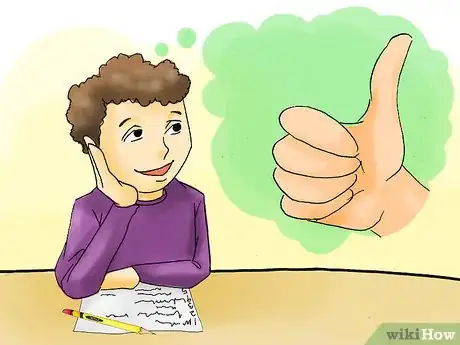
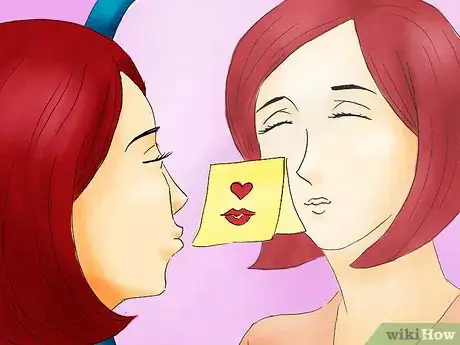
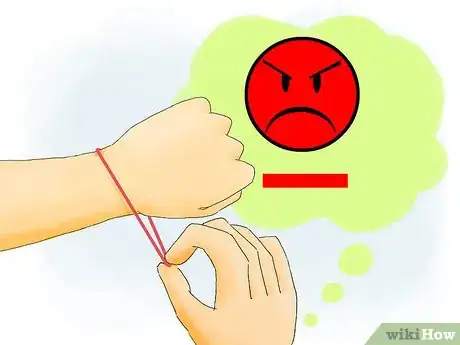

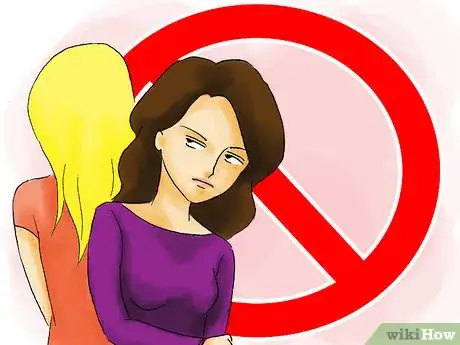
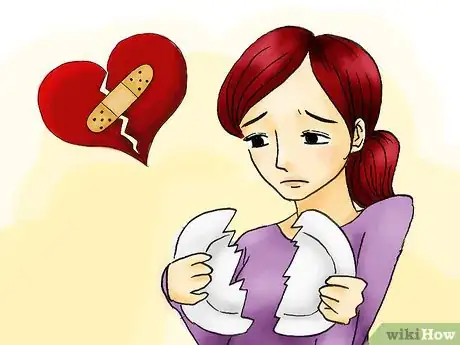
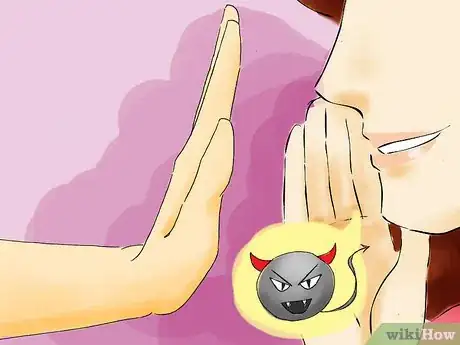
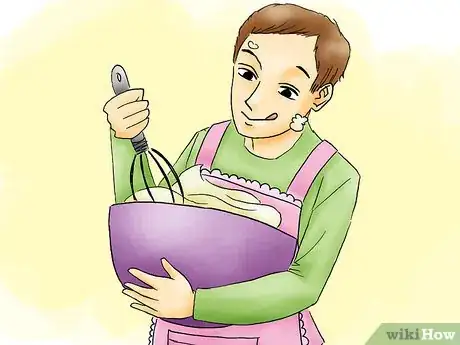










-Step-17.webp)




















































